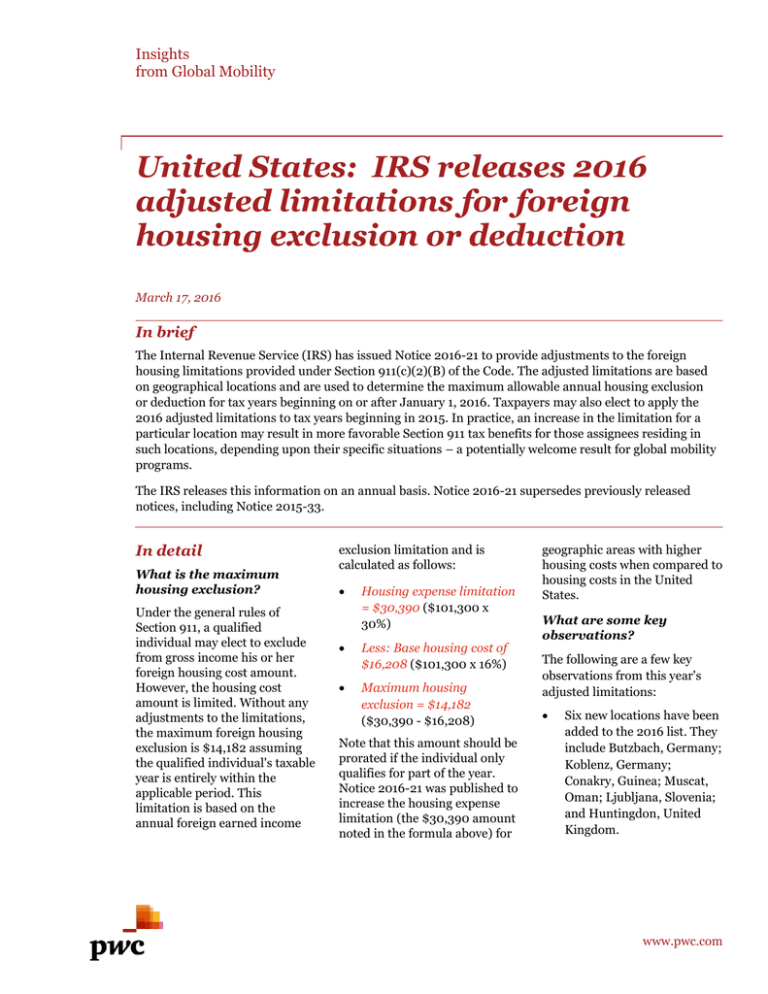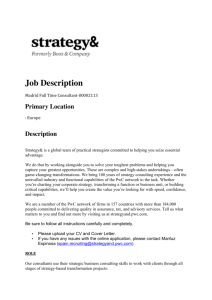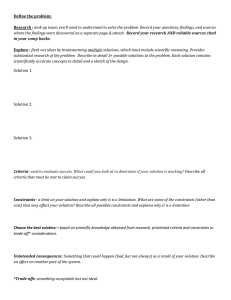
Insights
from Global Mobility
United States: IRS releases 2016
adjusted limitations for foreign
housing exclusion or deduction
March 17, 2016
In brief
The Internal Revenue Service (IRS) has issued Notice 2016-21 to provide adjustments to the foreign
housing limitations provided under Section 911(c)(2)(B) of the Code. The adjusted limitations are based
on geographical locations and are used to determine the maximum allowable annual housing exclusion
or deduction for tax years beginning on or after January 1, 2016. Taxpayers may also elect to apply the
2016 adjusted limitations to tax years beginning in 2015. In practice, an increase in the limitation for a
particular location may result in more favorable Section 911 tax benefits for those assignees residing in
such locations, depending upon their specific situations – a potentially welcome result for global mobility
programs.
The IRS releases this information on an annual basis. Notice 2016-21 supersedes previously released
notices, including Notice 2015-33.
In detail
What is the maximum
housing exclusion?
Under the general rules of
Section 911, a qualified
individual may elect to exclude
from gross income his or her
foreign housing cost amount.
However, the housing cost
amount is limited. Without any
adjustments to the limitations,
the maximum foreign housing
exclusion is $14,182 assuming
the qualified individual's taxable
year is entirely within the
applicable period. This
limitation is based on the
annual foreign earned income
exclusion limitation and is
calculated as follows:
Housing expense limitation
= $30,390 ($101,300 x
30%)
Less: Base housing cost of
$16,208 ($101,300 x 16%)
Maximum housing
exclusion = $14,182
($30,390 - $16,208)
Note that this amount should be
prorated if the individual only
qualifies for part of the year.
Notice 2016-21 was published to
increase the housing expense
limitation (the $30,390 amount
noted in the formula above) for
geographic areas with higher
housing costs when compared to
housing costs in the United
States.
What are some key
observations?
The following are a few key
observations from this year's
adjusted limitations:
Six new locations have been
added to the 2016 list. They
include Butzbach, Germany;
Koblenz, Germany;
Conakry, Guinea; Muscat,
Oman; Ljubljana, Slovenia;
and Huntingdon, United
Kingdom.
www.pwc.com
Insights
In a number of countries, smaller
cities whose housing costs are
generally higher than the standard
– but are not specifically listed
with a housing expense limitation
amount may fall under a catch all
for ‘all cities other than,’ with a
corresponding housing expense
limitation provided. In this way,
these cities are provided with an
expense limitation that is higher
than the general limitation
amount. This year, Korea, Italy,
and Norway no longer have this
catch-all category. Thus, smaller
cities not specifically listed will no
longer be eligible for higher
expense limitations.
As a result, those cities must use
the regular 2016 housing expense
drop of $9,700. These cities
include Garches, Paris, Sevres,
Suresnes, and Versailles.
Zweibrueken, Germany also
incurred a $9,700 decrease (from
$50,900 in 2015 to $41,200 in
2016.)
Milan, Italy had a decrease of
$9,600 (from $77,900 in 2015 to
$68,300 in 2016.) Sydney,
Australia had a decrease of
$8,600 (from $70,000 to
$61,400). Montreal and Toronto
in Canada also had decreases of
$8,100 and $8,300 respectively.
Madrid in Spain also dropped
from $63,600 to $55,700.
Hong Kong, China continues to
have the highest limitation of
$114,300, which remains
unchanged from last year's
limitation amount.
As an example, Halifax in Canada
was listed in 2015 but was
removed from the 2016 list.
Because there is no category in
Canada for ‘all cities other than,’ a
taxpayer resident in Halifax must
use the regular 2016 housing
expense limitation.
More cities than usual were
eliminated in this year’s list (as
compared to 2015). They include:
Darwin, Northern Country,
Australia
Antwerp, Belgium
Hoogbuul, Belgium
Brasilia, Brazil
Dartmouth, Canada
Edmonton, Canada
Halifax, Canada
Victoria, Canada
Le Havre, France
Bad Aibling, Germany
Bad Nauheim, Germany
Friedberg, Germany
Giebelstadt, Germany
Kitzingen, Germany
Wertheim, Germany
Wuerzburg, Germany
Catania, Italy
Leghorn, Italy
Pisa, Italy
Sigonella, Italy
Camp Caroll, Korea
Uijongbu, Korea
Waegwan, Korea
Stavenger, Norway
2
limitation amount unless there is
a catch all for ‘all cities other than’
that applies. If a city is not
specifically listed and there is a
catch-all category ‘all cities other
than’ for that country, taxpayers
should check that category to see
if they are able to claim a higher
expense amount.
Eleven Japanese cities saw the
same modest $700 increase to the
limitation on housing expenses
from $35,600 in 2015 to $36,300
in 2016. These include Atsugi,
Camp Zama, Chiba-Ken, Fussa,
Haneda, Kanagawa-Ken, MachidiShi, Sagamihara, Saitama-Ken,
Tachikawa, and Tokyo-to. But
limitations for other Japanese
cities had moderate reductions
including Tokyo which went from
$83,500 down to $81,300. Doha,
Qatar and Pyongtaek, Korea also
saw increases.
Many countries had a widespread
drop in the limitations for some or
all their listed cities. These
include Australia, Belgium,
Canada, Chile, France, Germany,
Greece, The Holy See, Ireland,
Italy, Korea, Luxembourg,
Netherlands, Norway, the
Philippines, Portugal, Qatar,
Singapore, Spain, Switzerland,
and the United Kingdom.
Five cities in France had the
largest decrease in the housing
limitation amount from $78,300
in 2015 to $68,600 in 2016 – a
The takeaway
It is important that taxpayers make no
assumptions about the housing
expense limitation from year to year.
Cities come on and off the list based
on housing costs annually – resulting
in significant increases and decreases
to expense limitations. Notice 2016-21
should be consulted to ensure that the
appropriate housing expense limit has
been taken into account.
The US tax reductions attributable to
Section 911 can provide an important
benefit for multinational companies
that tax equalize their employees
working overseas. Practitioners
should be aware of the additional
relief provided under Notice 2016-21
for US citizens and residents who
qualify for the foreign housing
exclusion or deduction under Section
911.
pwc
Insights
It is important to note that taxpayers
should consider whether Section 911
as compared to the foreign tax credit
will provide the greatest tax benefit −
an often complex determination due
to the various limitations.
Let’s talk
For a deeper discussion of how this issue might affect your business, please contact your PwC Global Mobility Services
engagement team or one of the following professionals in the United States:
Global Mobility Services – United States
Peter Clarke, Global Leader
+1 (203) 539-3826
peter.clarke@pwc.com
Al Giardina
+1 (203) 539-4051
alfred.giardina@pwc.com
Derek Nash
+1 (202) 414-1702
derek.m.nash@pwc.com
Clarissa Cole
+1 (213) 217-3164
clarissa.cole@pwc.com
Stay current and connected. Our timely news insights, periodicals, thought leadership, and webcasts help you
anticipate and adapt in today's evolving business environment. Subscribe or manage your subscriptions at:
pwc.com/us/subscriptions
SOLICITATION
© 2016 PwC. All rights reserved. PwC refers to the PwC network and/or one or more of its member firms, each of which is a separate legal entity. Please see
www.pwc.com/structure for further details.
This content is for general information purposes only, and should not be used as a substitute for consultation with professional advisors.
PwC helps organisations and individuals create the value they’re looking for. We’re a network of firms in 157 countries with more than 195,000 people who are committed to
delivering quality in assurance, tax and advisory services. Find out more and tell us what matters to you by visiting us at www.pwc.com.
3
pwc




